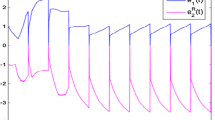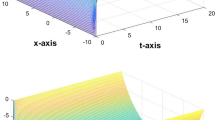Abstract
This paper investigates the fixed-time synchronization of memristive Cohen-Grossberg neural networks with impulsive effects. Through a nonlinear transformation and Fillipov discontinuous theory, we obtain an equivalent system from the original memristive Cohen-Grossberg neural networks. By constructing a discontinuous Lyapunov function and utilizing comparison principle, a sufficient condition is achieved to guarantee the fixed-time synchronization of drive-response system with impulsive effects. Moreover, for the purpose of reducing the cost of control, an adaptive control strategy is considered. Finally, corresponding numerical simulations are carried out to show the effectiveness of the analytic results.
Similar content being viewed by others
References
L. O. Chua, “Memristor-the missing circuit element,” IEEE Transaction on Circuit Theory, vol. 18, no. 5, pp. 507–519, September 1971.
D. Strukov, G. Snider, D. Stewart, and R. S. Williams, “The missing memristor found,” Nature, vol. 453, pp. 80–83, May 2008.
R. Li and J. Cao, “Stability analysis of reaction-diffusion uncertain memristive neural networks with time-varying delays and leakage term,” Applied Mathematics and Computation, vol. 278, pp. 54–69, March, 2016.
N. Li and J. Cao, “Lag synchronization of memristor-based coupled neural networks via w-measure,” IEEE Transactions on Neural Networks and Learning Systems, vol. 27, no. 3, pp. 169–182, March 2016.
X. Yang, J. Cao, and J. Liang, “Exponential Synchronization of memeristive neural networks with delays: interval matrix method,” IEEE Transactions on Neural Networks and Learning Systems, vol. 28, no. 8, pp. 1878–1888, May 2017.
M. Ali, R. Saravanakumar, and J. Cao, “New passivity criteria for memristor-based neutral-type stochastic BAM neural networks with mixed time-varying delays,” Neurocomputing, vol. 171, no. 5, pp. 1533–1547, January 2016.
F. Yao, J. Cao, P. Cheng, and L. Qiu, “Generalized average dwell time approach to stability and input-to-state stability of hybrid impulsive stochastic differential systems,” Nonlinear Analysis: Hybrid Systems, vol. 22, pp. 147–160, November 2016.
L. Chen, R. Wu, J. Cao, and J. Liu, “Stability and synchronization of memristor-based fractional-order delayed neural networks,” Neural Networks, vol. 71, pp. 37–44, November 2015.
A. Wu and Z. Zeng, “Global Mittag-Leffler stabilization of fractional-order memristive neural networks,” IEEE Transaction on Neural Networks and Learning Systems, vol. 28, no. 1, pp. 206–217, January 2017.
M. A. Cohen and S. Grossburg, “Absolute stability of global pattern formation of and parallel memory storage by competetive neural networks,” IEEE Transactions on Systems, Man and Cyberntics, vol. 13, no. 5, pp. 815–826, October 1983.
Q. Zhu and X. Li, “Exponential and almost sure exponential stability of stochastic fuzzy delayed Cohen-Grossberg neural networks,” Fuzzy Sets and Systems, vol. 203, pp. 74–94, September 2012.
W. Xie and Q. Zhu, “Mean square exponential stability of stochastic fuzzy delayed Cohen-Grossberg neural networks with expectations in the coefficients,” Neurocomputing, vol. 166, no. 6, pp. 133–139, October 2015.
R. Wei, J. Cao, and A. Alsaedi, “Finite-time and fixed-time synchronization analysis of inertial memristive neural networks with time-varying delays,” Cognitive Neurodynamics, vol. 12, pp. 121–134, January 2018.
R. Li, J. Cao, A. Alsaedi, and F. Alsaadi, “Exponential and fixed-time synchronization of Cohen-Grossberg neural networks with time-varying delays and reaction-diffusion terms,” Applied Mathematics and Computation, vol. 313, no. 15, pp. 37–51, November 2017.
X. Yang, J. Cao, and W. Yu, “Exponential synchronization of memeristive Cohen-Grossburg neural networks with mixed delays,” Cognitive Neurodynamics, vol. 8, no. 3, pp. 239–249, June 2014.
M. Liu, H. Jiang, and C. Hu, “Finite-time synchronization of memristor-based Cohen-Grossberg neural networks with time-varying delays,” Neurocomputing, vol. 194, pp. 1–9, June 2016.
J. Lu, D. W. C. Ho, and J. Cao, “A unified synchronization criterion for impulsive dynamical networks,” Automatica, vol. 46, no. 7, pp. 1215–1221, July 2010.
X. Yang and J. Lu, “Finite-time synchronization of coupled networks with Markovian topology and impulsive effects,” IEEE Tracactions on Automatic Control, vol. 61, no. 8, pp. 2256–2261, August 2016.
Y. Tang, H. Gao, W. Zhang, and J. Kurths, “Leaderfollowing consensus of a class of stochastic delayed multiagent systems with partial mixed impulses,” Automatica, vol. 53, pp. 346–354, March 2015.
G. Feng and J. Cao, “Master-slave synchronization of chaotic systems with a modified impulsive controller,” Advances in Difference Equations, vol. 2013, no. 24, DOI: 10.1186/1687-1847-2013-24, December 2013.
W. He, F. Qian, and J. Cao, “Pinning-controlled synchronization of delayed neural networks with distributed-delay coupling via impulsive control,” Neural Networks, vol. 85, pp. 1–9, January 2017.
H. Wang and Q. Zhu, “Finite-time stabilization of high-order stochastic nonlinear systems in strict-feedback form,” Automatica, vol. 54, pp. 284–291, April 2015.
X. Liu, H. Su, and M. Chen, “A switching approach to designing finite-time synchronization controllers of coupled neural networks,” IEEE Tracactions on Neural Networks and Learning Systems, vol. 27, no. 2, pp. 471–482, February. 2016.
H. Bao and J. Cao, “Finite-time generalized synchronization of nonidentical delayed chaotic systems,” Nonlinear Analysis: Modelling and Control, vol. 21, no. 3, pp. 306–324, 2016.
A. Polyakov, “Nonlinear feedback design for fixed-time stabilization of linear control systems,” IEEE Tracactions on Automatic Control, vol. 57, no. 8, pp. 2106–2110, August 2012.
X. Yang, J. Lam, D. W. C. Ho, and Z. Feng, “Fixed-time synchronization of complex networks with impulsive effects via non-chattering control,” IEEE Tracactions on Automatic Control, vol. 62, no. 11, pp. 2106–2110, November 2017.
A. F. Filippov and F. M. Arscott, Differential Equations with Discontinuous Right Hand Sides: Control Systems, Dordrecht, Kluwer, Springer.
Author information
Authors and Affiliations
Corresponding author
Additional information
Recommended by Associate Editor Ohmin Kwon under the direction of Editor Jessie (Ju H.) Park. This work was supported by the Jiangsu Provincial Key Laboratory of Networked Collective Intelligence under Grant No. BM2017002.
Ruoyu Wei received the M.S. degree in applied mathematics from Southeast university, Nanjing, China. He is currently pursuing the Ph.D. degree with Southeast university, Nanjing, China. His current research interests include neural networks, multiagent systems and control theory.
Jinde Cao received the Ph.D. degree in applied mathematics from Sichuan University, Chengdu, China, in 1998. He is an Endowed Chair Professor, the Dean of School of Mathematics and the Director of the Research Center for Complex Systems and Network Sciences at Southeast University. From March 1989 to May 2000, he was with the Yunnan University. In May 2000, he joined the School of Mathematics, Southeast University, Nanjing, China. From July 2001 to June 2002, he was a Postdoctoral Research Fellow at Chinese University of Hong Kong, Hong Kong. Professor Cao was an Associate Editor of the IEEE Transactions on Neural Networks, and Neurocomputing. He is an Associate Editor of the IEEE Transactions on Cybernetics, IEEE Transactions on Cognitive and Developmental Systems, Journal of the Franklin Institute, Mathematics and Computers in Simulation, Cognitive Neurodynamics, and Neural Networks. He is a Fellow of IEEE, a Member of the Academy of Europe, a Member of European Academy of Sciences and Arts and a Foreign Fellow of Pakistan Academy of Sciences. He has been named as Highly-Cited Researcher in Engineering,Computer Science, and Mathematics by Thomson Reuters/Clarivate Analytics. He received the National Innovation Award of China (2017).
Ahmed Alsaedi received his Ph.D. degree from Swansea University (UK) in 2002. He has a broad experience of research in applied mathematics. His fields of interest include dynamical systems, nonlinear analysis involving ordinary differential equations, fractional differential equations, boundary value problems, mathematical modeling, biomathematics, Newtonian and Non-Newtonian fluid mechanics. He has published several articles in peer-reviewed journals. He supervised several M.S/Ph.D students and executed many funded research projects. He is a reviewer of several international journals. He served as the chairman of the mathematics department at KAU and presently he is serving as director of the research program at KAU. Under his great leadership, this program is running quite successfully, and it has attracted a large number of highly rated researchers and distinguished professors from all over the world. He is also the head of NAAM international research group at KAU.
Rights and permissions
About this article
Cite this article
Wei, R., Cao, J. & Alsaedi, A. Fixed-time Synchronization of Memristive Cohen-Grossberg Neural Networks with Impulsive Effects. Int. J. Control Autom. Syst. 16, 2214–2224 (2018). https://doi.org/10.1007/s12555-017-0788-5
Received:
Revised:
Accepted:
Published:
Issue Date:
DOI: https://doi.org/10.1007/s12555-017-0788-5




